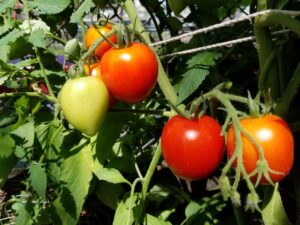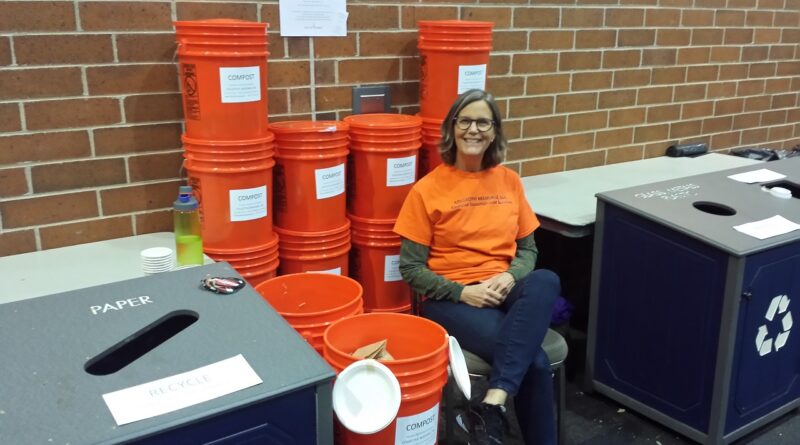Food Scrap Composting Queen
Podcast: Play in new window | Download (Duration: 1:33:59 — 43.0MB)
Subscribe: Apple Podcasts | Spotify | Android | iHeartRadio | Podchaser | Email | TuneIn | RSS | More
(July 26, 2020) It’s been a good ten years for Erlene Howard and Collective Resource Compost. The COVID-19 pandemic has forced her to make some adjustments. However, her food scrap composting operation continues to thrive. In its decade of operation, the company has diverted 6,550 tons of organic matter from landfills. In addition to serving individual residences and businesses, CRI recently introduced a Neighbor Totes program for composting communally.
Skip to a specific segment in this podcast
3:48 Erlene Howard of Collective Resource Compost
24:31 Tomato Joe
47:02 Jared McKenzie and Mark Burger
1:11:33 Meteorologist Rick DiMaio
This is one of those classic stories about somebody who took matters into her own hands to solve a problem. Howard was living in a condo and wanted to create food scrap compost. But little was available to her. Fortunately, her timing was good. Illinois had just enacted Public Act 96-0418, making large scale food scrap composting legal in the state. Howard began with three customers and 5-gallon buckets, into which they left their food items. Now, she has1400 residential and nearly 300 commercial customers.
Here’s how it works:
Our residential composting service provides door-to-door pickup of food scraps and other compostable matter. We provide a 5-gallon bucket to your family and then weekly or biweekly pick up the food scraps and take them to a commercial compost site. We leave a clean bucket for you to continue your collection for the next pickup. Most households work with some kind of countertop container and then empty into the big bucket when needed. Some customers choose to keep the bucket outside with a brick or flower pot on top, or it can be put out on your pickup day.
Commercial composting is different than yard composting. At a commercial site, you can compost anything that was once alive, including animal products and food-soiled paper. Click here for a complete list.
As CRI writes on its website, “During their first six months of business, Collective Resource collected a single ton. Now they collect at least twice that amount every day, averaging 20 tons per week. In June of 2019, the company celebrated a total collection milestone of 5,000 tons.”
And, ten years after launching the business,
Their Chicagoland service area has grown to include over 50 communities and neighborhoods. Special pricing is available for the municipalities of Evanston and Skokie who have entered into franchise agreements with CRC in the last couple of years. Their mission-based company strives to educate its customers on not only composting and zero waste but other areas of sustainability including environmental justice. This is accomplished through their blog and on social media. They are active participants in Illinois Food Scrap Coalition (IFSC) which is dedicated to advancing food scrap diversion in Illinois.
Last, but certainly not least, it’s a woman-owned company. A number of competitors have sprung up over the years, and that’s good! The more, the merrier, if you ask me. But she was the first. And we’re pleased to have Erlene Howard back on the show after too long a time.
Introducing Tomato Joe

Almost two months ago, we talked to two of our favorite tomato guys. One is Craig LeHoullier, also known as “NC Tomatoman” because he lives in North Carolina. The other is KC Tomato, aka Keith Mueller, who lives in Kansas City, MO. After that show, I received an email from a guy who called himself “Tomato Joe.” He wanted seeds from a couple of the plants that KC Tomato grows. So I wrote back and asked him to tell me a little bit about himself. Here’s part of what he wrote.
I live in PA and I am an avid tomato hobbyist. LOL I’m not sure how I got the name of “TomatoJoe”. Maybe it’s because once you get me started I can talk your ear off on “tomatoes”. I consider myself to be some what of a tomato historian. Because I have such limited space (75% of my tomatoes are grown in grow bags) I’m only able to grow approximately 20-23 different varieties a year however I select varieties that come with a story. My garden is actually a “tribute garden” a tribute to past gardeners who devoted their lives to producing great tasting fruit. I’ve grown tomatoes introduced by the likes of Alexander Livingston who is considered to be the Father of The Commercial American Tomato. His first offering was called the Paragon (which was the name of popular canning jar used at that time. It took him 20 years to perfect it. He began in 1850 and released it in 1870. I have grown this variety as a tribute to him and all of his efforts. I might add that he wrote a book describing his work which I have in my “Tomato Library” along with Thomas Jefferson’s Gardening Journal and many others. LOL
Joe’s real name is Joe J. Toner, Jr. I later discovered that he grew up in Upper Darby, Pennsylvania and now lives in Palmerton, PA. He says that he has never met Craig LeHoullier, but that they have become Internet friends.
I’ve never personally met him but we are internet friends. He is one of the most down to earth guys you could ever meet and his knowledge of tomatoes is quite impressive. He always responds to any question I may have and does it within an hour or 2. Wow…a world-renown author answering my questions still “knocks my socks” off. Craig even sent me seeds from his garden and I grew them as a tribute to him.
Joe is modest, but he’s already a bit of a celebrity himself. When I heard his story, I knew I needed to have him on The Mike Nowak Show with Peggy Malecki. Especially since he had taken the time to listen to the show in June, when Craig LeHoullier and KC Tomato spoke to us. When I asked for more information, he sent this.
My dad’s mom had a degree in horticulture and although she passed before I was born. I did hear stories about the greenhouse that she had in her backyard. Fast forward to 2012 I’m retired and now working in a big box store in the outside lawn and garden department as a part-timer. Customers are coming into the store asking me about tomatoes and although I had always grown them in my garden I really didn’t know much about them. This set the wheels in motion. Customers need answers and I decided to learn as much as I could about tomatoes and how to grow them and this quest for this knowledge continues. There is always something knew to learn. The history of the tomato is a fascinating one especially when your begin to learn about the pioneers who spent their entire lives devoted to creating the perfect tomato. This is what I enjoy the most. Not only learning about them but growing the varieties that they created..
If you’re a regular listener to the show, you know that I tell you to shop at your local independent garden center. The reason, as I explain, is because the folks at the big box stores aren’t going to know anything about the plants you’re purchasing.
Well, there’s always an exception to the rule. Tomato Joe is that exception. Which is why he’s on today’s show.
Going solar in the midst of a pandemic
One of the things I’ve lamented during the global coronavirus pandemic is our retreat regarding the environment. It’s bad enough that our so-called leaders are gutting our environmental protections. But it doesn’t mean you have to go along with bad decision-making. In fact, one person argues that people are already thinking ahead. And they’re choosing solar energy.
Though the scientific data about how fossil fuels harm the environment is abundant, most people don’t spend their time reading statistics. But everyone can understand photos. We’re seeing city skylines without smog and mountain ranges visible from farther away. There are already hundreds of new photos showing visibly cleaner air in major metropolitan centers. The immediate effect of closed factories and absent vehicle traffic is producing data that simply could not have been designed as a real-world experiment. More people can now literally see the benefits of reducing fossil fuel usage.
The person who wrote that is Jared McKenzie. He founded a company called Headline Solar. They claim to be the fastest growing residential solar company in the Midwest. They chose Illinois as their home in 2018 following enactment of the Future Energy Jobs Act (FEJA) in 2016, which made Illinois a real player in the solar energy industry. Because of that law, the state’s renewable portfolio standard (RPS) requires 25% of its electricity production to come from renewable sources by 2025.
Headline Solar says that its 2020 revenue–even in the midst of a pandemic–has increased 187% over 2019 numbers. Its projections show that they are poised to realize a 180% growth in kW sold from 2019 to 2020. And they see a 194% increase in jobs sold over 2019 numbers.
Which brings us to Mark Burger. He is a renewable energy consultant for non-profit organizations and communities looking to develop solar projects and programs, working with companies like Seven Generations Ahead, Over The Rainbow Association and Blacks In Green. Mark has had wide experience in renewable energy, energy efficiency and energy assistance with CEDA, the US Department of Energy and Spire Solar, and is a Past President of the Illinois Solar Energy Association.
He says that we’re not close enough to releasing the fossil fuel grip on our citizens.
FEJA has only begun to scratch the surface in a large state like Illinois. The state is still lagging behind the goals of Illinois getting 25% of its electricity including more than 1% from solar by 2025. The Illinois Solar For All Program is just getting off the ground, and will need much more resources to seriously close the equity gap between Environmental Justice Communities and the rest of the market. These challenges will need to be remedied by major new legislation like the Clean Energy Jobs Act and/or the Path To 100 Act that need to be enacted this year in the Fall Session. To seriously address the energy, economic, environmental and equity challenges of getting to 100% Renewable Energy (we’re not even at 10% yet) before 2050 or 2040, we have to increase investment by an order of magnitude.
Hmm. Are we moving forward or not? I guess we’ll find out today when we talk to Jared McKenzie and Mark Burger. BTW, there are two events that you might want to know about. The first is Monday, July 27, when the Seven Generations Ahead program Solarize Chicagoland presents a Virtual Solar Power Hour from 1-2pm. Then, on July 30, the ISEA is having a webinar called Powering Your Home with Solar Energy. There’s a lot to learn. Let’s get started.

